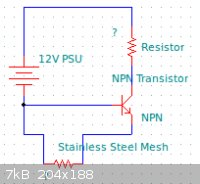
smaerd - 28-8-2012 at 16:12
I am working on a project that needs a 1-2A power supply for a joule heating experiment. Originally I bought this phone charger and it said that it
ran 12V 1A. I hacked off the charger end and tested it with a volt meter and it's only running 0.4A. So I was looking at the circuit of the 'brick'
and it appears there are two resistors on the PCB just before the 'load' wires. Was thinking well, I = V/R. So if I unsoldered one of the resistors
and put one with a smaller resistance in, it just might work. Then I thought about it and the last time I did something like this I had to flip the
circuit breaker and had to jump back from a popped capacitor.
I was basically wondering is there any 'simple' way to increase current of something like this? I know increasing wire diameter and using a solid wire
can also increase current though it seems impractical. Or a hint towards very cheap DC power supply that genuinely runs at 1A-2A(my other supply is
well over 10A)?
triplepoint - 28-8-2012 at 17:03
If you only need to power the project for testing purposes, you may want to look into converting a computer power supply. They're not expensive and
you have flexibility in current and voltage. There are lots of sets of instructions available. It's not difficult and its nice to have around if you
like to tinker. You can even use it for electrolysis.
Diablo - 28-8-2012 at 17:48
Or you could try two chargers in parallel.
smaerd - 29-8-2012 at 07:03
I have built a PSU from an ATX computer power supply. I plan on building a self-contained unit rather then one that relies on that power supply. Two
chargers in parallel isn't a bad idea though it would use two out-lets. Maybe I'll run it off of NiMH batteries or something instead.
Nevermind a transistor won't work...
[Edited on 29-8-2012 by smaerd]

